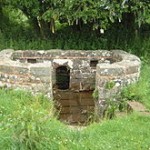I am so pleased that Yvonne, my co-writer here at Sermons from the Mound, has been holding down the fort and posting solid content while I’m finishing the last (I hope!) revision of Eros and Touch from a Pagan Perspective: Divided for Love’s Sake. I also just booked an artist to do the cover, which I hope to be able to share with you when it’s done!
Also of note today: a new blog, Jewcraft. Despite this blog not being about Pagan scholarship or theology, I think many of its potential readers may be reading here.
I know many, many cultural Jews in the Pagan community who are always looking for ways to relate their Paganism to their Jewish heritage. This blog is written by someone writing as both an insider and an outsider, with a Pagan past and a Jewish present. I love it when people do theology in ways that challenge the authorities and normative structures in their communities (and, I have to admit, the calculated use of profanity in theological discourse just tickles me ;> ). Also, I know many of you out there, like me, had a flirtation with Judaism at some point, and many of us still work with kabbalah, so there’s some fun here for our sort as well.
Sadly, there is some problematic anti-Jewish feeling in contemporary Paganism. Jews may be a culturally powerful minority, but the Holocaust happened less than a century ago, and there are currently existing Pagan groups who have anti-Semitism as a significant part of their belief structure (I am thinking here of particular Baltic Pagan and northern European Heathen groups – happily, I believe they in are the minority). Still, I recently heard a major Pagan scholar give a lecture in which he (in the course of two paragraphs) acknowledged the Shekinah, the immanent spirit of the divine in the world in Judaism, and then assigned blame to Judaism for giving the West its transcendent view of deity. If we have to point fingers—which I don’t—I think that Greek Neoplatonism is just as much if not more to blame for this “problem.”
There’s also a tendency in Paganism to dismiss Hashem as “that desert demon.” But all things look simpler from the outside, and this blog looks to present Jewish traditions of conversation with and challenge to the Jewish god. Remember your process theology: deities change, just like the world, just like human beings.
In any case, the alternative understanding of Torah being presented here will give Pagans juicy food for thought when it comes to their perceptions of Jews and their god. Its model of deeply engaging tradition while willing to question normative understandings of it is also something we fruitfully emulate. From the introduction:
I want to talk about the dark side of Judaism as it actually is. I want to talk about Jewish spiritual eroticism, Jewish ecstatic practice, and Jewish folk magic. […]
The dark side of Judaism […] is a terrifying place where the awesomely powerful Deity who stands toe-to-toe with the Creator of All is you.












